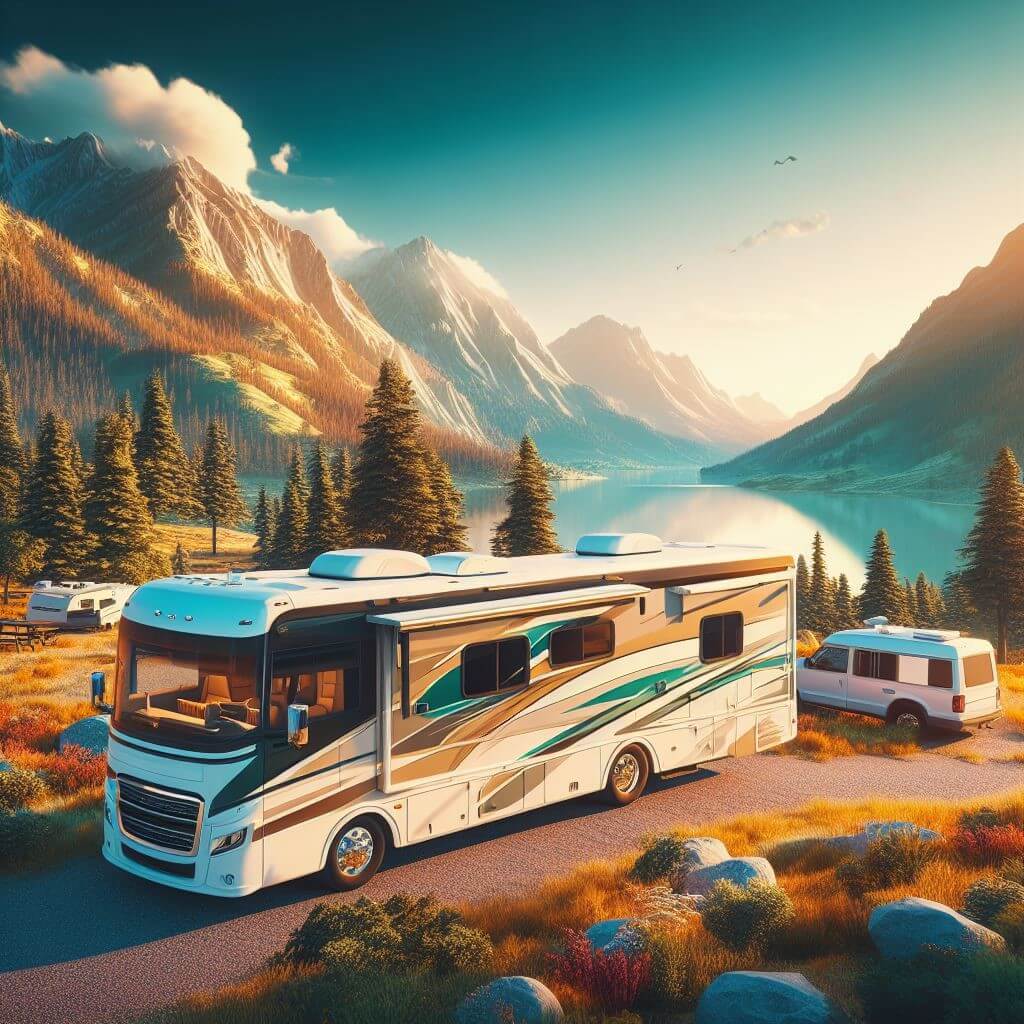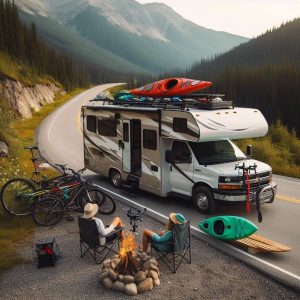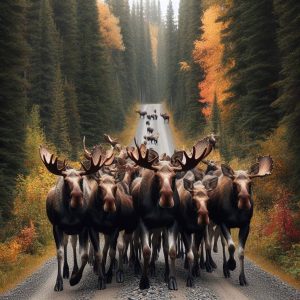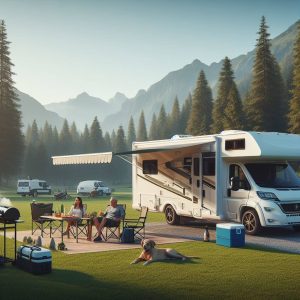
Love the freedom and adventure of traveling in an RV? Of course, you do! However, with fuel costs rising, we all know that burning up the miles on that long highway is not getting any cheaper. Unfortunately, fuel costs can quickly add up, especially if you’re not getting the best fuel mileage possible. However, don’t despair, Highway Adventurer, because I have some awesome tips and tricks to help you maximize your RV’s fuel consumption. So, refuel your coffee mug and read on!
Your RV
The fuel mileage of an RV can also vary depending on the type of engine it has. Diesel engines are typically more fuel-efficient than gas engines, but they also come with a higher price tag.
Types of RVs and Their Fuel Efficiency
When it comes to fuel efficiency, the type of RV you have can make a big difference. Here is how different types of RVs stack up in terms of fuel economy:
- Class A RVs: These are the largest and heaviest RVs on the market, and as such, they tend to have the lowest fuel economy. On average, a Class A RV will get around 6-8 miles per gallon.
- Class B RVs: These are smaller and more compact than Class A RVs, and they are built on a van chassis. As a result, they tend to be more fuel efficient, with an average of around 18-20 miles per gallon.
- Class C RVs: These are built on a truck chassis and are generally larger than Class B RVs but smaller than Class A RVs. They tend to get around 10-12 miles per gallon.
It’s worth noting that there are many different makes and models of RVs within each of these categories, and fuel economy can vary depending on a number of factors, including the weight of the RV, the engine size, and the driving conditions.
Key Takeaway: I guess it’s fairly obvious, but the smaller your RV the less fuel it’s going to use. If you’re thinking about downsizing to a smaller, more fuel-efficient RV, or you’re looking to buy a new one, you may want to check out this list of recommended Class B models:
Key Factors Affecting RV Fuel Mileage
However, if you’re not currently in the market for purchasing a new RV, it’s worth understanding the factors that can affect the fuel mileage of your current rig in order to achieve the best gas mileage possible and save money on fuel costs.
Rethink Your Load
Weight is one of the most important factors affecting RV fuel mileage. The heavier the RV, the more fuel it will consume. Streamline your packing to ensure that you really are only taking what you need for that particular road trip.
Traveling in the summer? Make sure your winter gear isn’t lurking in your under-bench storage cupboards, for example. Towing a small car behind you? Really? Think about your destination and whether you’re really going to need it when you get there- that would make a real difference to your fuel economy. You may want to consider whether it’s really necessary to bring grandma, grandpa and eight nephews and nieces on the trip, too…know what I’m saying?!
Your fuel efficiency decreases by around 2% for every extra 100 pounds of weight in your RV, so the amount of stuff you actually pack into your vehicle really does make a difference. Therefore, packing strategically really does make sense.
Drive Slowly and Consistently For Better Mileage
Obviously, the harder your foot is pressing on that gas pedal, the more gas you’re going to consume. The most efficient speed to maximize your RV’s fuel mileage is between 55-65 mph. So the message is: slow down and enjoy the journey- even if the kids are asking you “Are we there yet?” for the 45th time!
“Every five miles per hour over 50, for instance, can end up costing an additional $0.17 per gallon.”
https://koa.com/blog/3-easy-hacks-to-improve-your-rvs-gas-mileage/
So the cost soon mounts up. A good tip is to use cruise control where possible, especially on those long flat stretches of road.
The trick is to remember not to drive your RV like you would your car- it’s a very different beast! Maximize your fuel consumption by accelerating and decelerating gradually. Take your time to get up to speed. Coast to a stop, rather than stamping on the pedals and sending all the contents of your kitchen (and Grandma) whizzing past your ears.
Streamline Your RV
Another great tip to maximize your RV’s fuel consumption efficiency is to make sure that your RV is as streamlined as possible. Minimise air resistance by avoiding the unnecessary additions of roof racks and packing boxes if possible.

Plan Your Route Ahead of Time
Ok, I know…’Free as a bird..’ and all that, but going just where the whim takes you can really burn up that fuel in a big rig like your RV! Taking the wrong turning and having to turn round…rumbling down those moose tracks…just following your nose is not so romantic in real life.

Trip Wizard
Instead, it really is worthwhile sitting down before your road trip and planning it out carefully. A good idea is to use the Trip Wizard app from RV Life to plan your route properly ahead of time.
Here are some fuel-maximizing tips for route planning:
- Avoid going through major towns and cities if you can. As you know, major settlements are full of stop signs and crossings, traffic jams, and such. All of these involve stopping and starting, which burns up a lot of fuel.
- Avoid idling the engine. Sometimes it’s just inevitable that you’re going to get caught in a traffic jam. Sometimes you’re going to have to stop to wait for that big old freight train with 99, 000 carriages to pass. Or it might be a mama bear with three or four cubs, or whole herd of moose or bison. Just switch off the engine and wait it out, because there simply ain’t nothin’ you can do!

- Listen to the traffic reports on the radio so that you can avoid traffic incidents where possible.
- A great tip is to sign up for an app such as Open Roads to locate the gas stations where you can get a discount on your fuel: this can really make a difference. If you plan your trip ahead you will be able to find those gas stations before you leave home and plan them into your route.
Avoid Unnecessary Trips
Maximize your gas mileage when you arrive at your campground by letting your RV have a good old snooze- its work is done! Now that you’ve arrived, stay put for a few days and use local transport to explore your new surroundings. Hey, you could even put those expensive shiny new electric bikes to good use! Maybe you could hitch a ride into town with fellow campers- a good chance to make some new friendships!

A good tip is to try to do all your errands in one trip if you do have to drive, rather than lots of back and forth, which eats up a surprising amount of fuel.
Now let’s look at some easy tips and tricks you employ in your RV maintenance routine to give you more bang for your buck.
Engine and Maintenance
Let’s talk about the importance of regular servicing. Yes, it’s a bit of a stinger at the time, but regularly servicing your RV actually saves a lot of money and pain in the future. Here’s a fact for you: a dirty air filter can reduce fuel efficiency by up to 10%- ouch!
According to this expert blog: https://koa.com/blog/3-easy-hacks-to-improve-your-rvs-gas-mileage/
“a faulty oxygen sensor can reduce mileage by up to 40 percent.”
Wow- that’s a significant amount of cash, I’m sure you’d agree!
Top Tip: Keep Your Tyres at Optimum Inflation
Check your RV manual for guidance on the correct psi for your tires. If you don’t have the manual, then have a look at the tire wall, because it will be printed on there. Use this simple tire gauge to measure the air pressure in your tires each day before you hit the road.
Properly inflated tires can reduce wear and tear on your RV’s wheels, which means they’ll need to be replaced less frequently and there’s less chance of a blow-out.
Underinflating tires by only 10 psi will decrease fuel efficiency by 2% per mile, which is quite a tidy sum if you’re on a long road trip. It can pay to have a tire monitoring system installed in your motorhome.
Check Your Oil Level
Did you know that using synthetic oil can increase fuel economy by more than 2%? Definitely worth checking that your engineer is using the synthetic stuff when you’re getting your service, then, or if you’re changing your oil yourself.

Turn Off Air Conditioning
Remember that using air conditioning can also swallow an alarming amount of fuel. Try to use it sparingly-open the windows instead and enjoy that good old country air!
Understanding and Managing Fuel Costs
When it comes to RV travel, fuel costs can add up quickly. Understanding and managing them can help you get the best fuel mileage out of your RV. All the extra money you save can be spent on essentials-( like beer, and coffee, for example.)
Fuel prices can also have a big impact on your travel budget. To manage fuel costs, it’s important to plan your route and know where to find the best fuel prices. Using a fuel app or website, such as GasBuddy, can help you find the cheapest fuel prices along your route.
Budgeting for fuel costs is another important aspect of managing fuel costs. By estimating your fuel costs and including them in your travel budget, you can avoid unexpected expenses and keep your travel budget on track.
Finally, consider investing in a fuel economy chip or upgrading your oxygen sensor to improve your RV’s fuel efficiency. These upgrades can help you get more miles per gallon and save money on fuel in the long run.
Happy RVing, Adventurers!
Affiliate Disclosure: this article contains affiliate links, which will make me a small commission if you click through on them and buy anything as a result. This will be at no extra cost to you, but will help to fuel my expensive coffee habit.

One thought on “How to Maximize Your RV’s Fuel Mileage: Tips and Tricks”
Comments are closed.